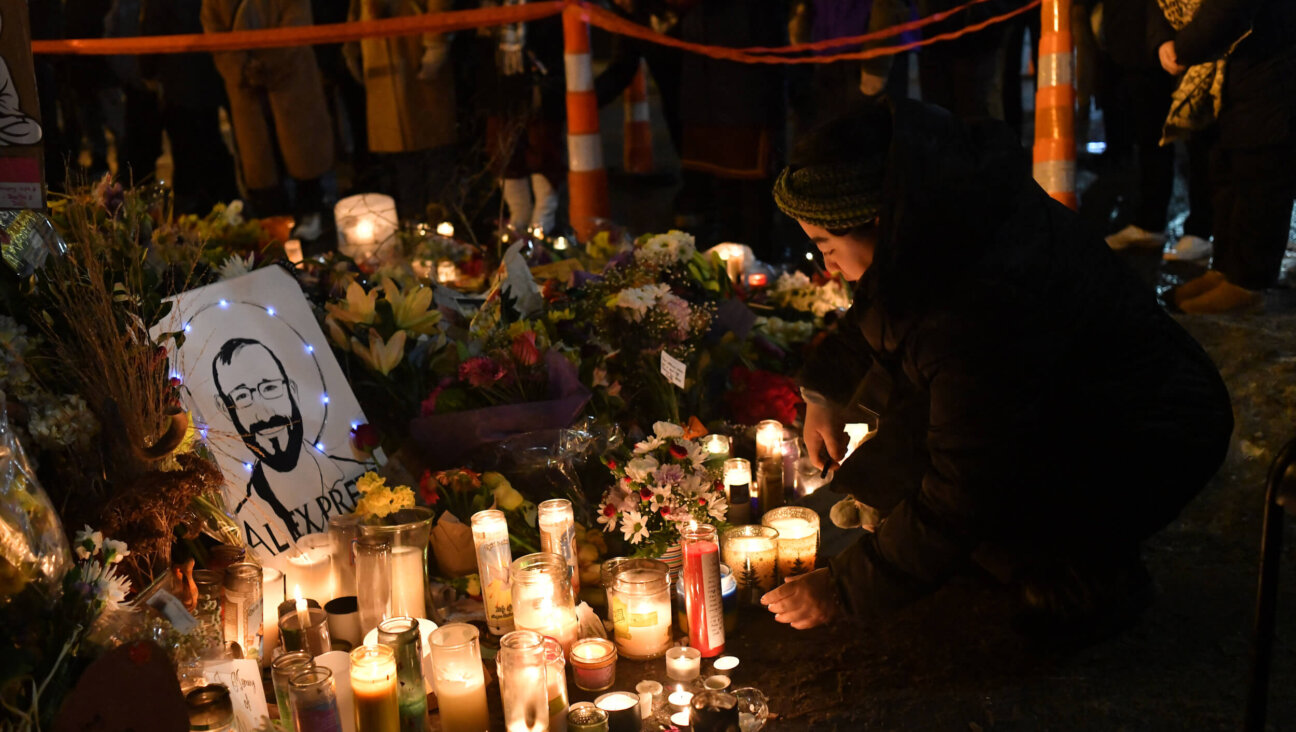A Turkish Writer Returns to the Ghosts of His Past
‘I don’t believe there is any Jewish writer writing today, whatever the age, who is not somehow consciously or unconsciously affected by the Holocaust,” said novelist and human rights activist Moris Farhi. “I don’t think any enlightened European writer can escape the effects of the Holocaust.”
Indeed, phantoms haunt Farhi, one of today’s foremost chroniclers of exile and dislocation. As a writer he is attracted to ghosts of a tragic past. His book “Journey Through the Wilderness” (Pan Macmillan, 1989) depicts the vanishing world of the South American Amerindians, and his epic masterpiece “Children of the Rainbow” (Saqi Books, 1999) is a paean to the Sinti and Roma people ravaged by the Holocaust. (Farhi spent years immersed in Gypsy lore. He lived with the Roma in Skopje, Macedonia.) And yet, despite his deep concerns for memory and justice, he confided in an interview that until recently, he could not write about the Jewish Holocaust: “Somehow it was too close to me.”
Moris (Musa) Farhi was born in Ankara, Turkey, in 1935. His mother was the only member of her family to survive the Holocaust — a result of her decision to leave her native Salonika, Greece, and marry in Turkey. His mother’s loss and suffering irrevocably marked Farhi’s childhood, but he kept the memories buried for years. Only now, well into his 60s, has Farhi returned to his roots with his semi-autobiographical homage to innocence lost, “Young Turk” (Saqi Books, 2004). The impressionistic novel of 13 intertwined tales illustrates the peaceful coexistence of the Muslim, Jewish, Armenian, Greek and Gypsy communities in the crumbling remnants of Ottoman cosmopolitanism. It is a world haunted by the scars of war, erotic mystery and dashed desires.
In an interview a few days before his book launch at the prestigious Jewish Book Week Festival in London (February 28 to March 7 of this year), Farhi offered that this novel is his love story about Turkey. “If you want, [call it] an unrequited love, because I left Turkey when I was 19 — and yet I always hankered for the multiethnic, multicultural aspect of Turkey, which for me was the greatest thing that existed at the crossroads between Europe and Asia, North and South, Russia and the Arab world,” he said.
Some of the most powerful passages in “Young Turk” chronicle the impact of the varlik vergisi (the wealth tax), a levy concocted by “finance ministry officials and arriviste entrepreneurs — all of them declaring themselves ‘pure’ Turks — to target non-Muslim businessmen and hit them as hard as they can.”
“My father was taken into forced military service. The bailiffs had taken all our furniture away. We were left with one mattress for my mother and myself,” Farhi recalled. “On the other hand, you had the common people who helped.” As a result of this everyday heroism, young Moris never starved because masons and Muslim neighbors lent a helping hand.
Farhi’s life in literature was not preordained. He arrived on British shores for continued higher education after completing a bachelor’s degree at the Istanbul American College in 1954. “I wanted to be an actor. I didn’t want to be an academic. I was very much in love with the theater,” he said. “So I ran away, against my father’s wishes, to take an audition with the Royal Academy of Dramatic Arts.” He was accepted, and after two years of training he sought to ply his trade in the limelight. Lacking the perfect English accent, Farhi was often typecast. In those lean years, he primarily earned his keep touring or in repertory in such dramatic staples as “The Iceman Cometh” and “A View From the Bridge.”
But Farhi found his first true success as a scriptwriter in the halcyon days of British television. His career as a scribe flourished as commissions flowed in from the British Broadcasting Corp. and Independent Television. Farhi penned episodes for popular shows, such as “The Return of the Saint,” “Man in a Suitcase,” “The Onedin Line,” “Out of the Unknown” and “Menace.” Now a seasoned veteran of TV writing, Farhi considers himself lucky to have trained in the medium. “Television teaches you… a) how to use dialogue; b) the visual; and c) how to arrange a scene or where to start a chapter,” he said.
Farhi bid farewell to television with the release of his self-described “first serious novel,” titled “The Last of Days.” (Farhi had published an earlier novel called “The Pleasure of Your Death.”) “The Last of Days” pitted Israeli and Jordanian intelligence operatives against Arab terrorists after the fallout of the Yom Kippur War. The commercial and critical success of the work convinced American director and actor Sam Wanamaker to adapt the novel for the cinema. The filmmaker envisioned screen legend Marlon Brando in the marquee role. Commenting on Wanamaker’s ill-fated casting goals, Farhi concluded, “in the end, it just collapsed as most films do. I think it was a pipe dream to get Brando.”
In 1980, Farhi joined the literary organization International PEN, where he rose in the ranks to serve first as chair of its Writers in Prison Committee and, since 2001, as an international vice president of the organization. In both capacities, Farhi championed freedom of expression and actively campaigned for the release of imprisoned writers and journalists the globe over. On June 16, 2001, in the Queen’s Birthday Honours List, he was appointed a Member of the Order of the British Empire (MBE) for “services to literature.”
While Farhi fears a world rapidly loosing its pluralism, he doesn’t feel trapped by the specter of the Holocaust. “I think Jews to some extent are just as guilty as all the other religions of using past grievances as justification for forgetting how to live,” he said. Instead Farhi focuses on dissenting voices that help keep pluralism alive and well — including, among others, famed dissident Turkish poet and playwright Nazim Hikmet. Farhi actually campaigned for Hikmet’s release from prison in the 1950s, even going so far as to get himself arrested twice for distributing Hikmet’s work. One of most the stirring moments in “Young Turk” is the fictional account of an attempt to spring Hikmet from captivity. That story’s closing words, set in verse, show us how persecution of artists renders culture speechless:
When a writer is killed
Language
Loses one of its words
When all writers are killed
There will be
No words left
No Language
Only
Dictators
Racists
Nationalists
Whores of war
False prophets
Only
The Worship of Death.
In passages such as these, Farhi’s work restores the voice and memory of pluralism and artistic expression. Overall, his work, in its humanity and tolerance, serves as a welcome reminder to celebrate life in all its diversity.
Neal Sokol has written for The Literary Review, Jewish Quarterly and Tiferet, among other publications. His latest work, “Eight Conversations: Ilan Stavans,” will be published this month by University of Wisconsin Press .













